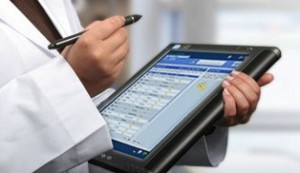 Clinical Ink, a pharma-focused mobile clinical trial data collection company, has raised $4.3 million. FCA Venture partners led the round, with additional funding from 10 undisclosed angel investors.
Clinical Ink, a pharma-focused mobile clinical trial data collection company, has raised $4.3 million. FCA Venture partners led the round, with additional funding from 10 undisclosed angel investors.
Clinical Ink makes SureSource, a windows-based tablet software for healthcare providers to collect clinical trial data electronically at the point of care. They use Windows tablets because stylus entry allows for unstructured as well as structured data entry -- doctors can not only fill out forms, but also make margin notes that can be referenced later.
"We're very eager and excited about our approach," CEO Ed Seguine told MobiHealthNews. "At least in the pharma industry, people sometimes think that just because we've got EMRs everything will automatically be available for clinical trials. That's so naive as to be laughable actually."
Seguine said the timing of the funding was a combination of an influx of pharmaceutical customers and new regulatory clarity. The FDA recently published two guidance documents on risk based monitoring and electronic source data. Between them, the documents allow FDA auditors to rely on electronic source data when evaluating clinical trials for drugs and to access that data remotely rather than spending the resources to go onsite.
"When the FDA audits a drug, if they have questions about the integrity of the data, they go back to that original site," he said. "And that's the critical thing, that we can capture all of that interaction, all of that data electronically. That frees up the sponsor companies to approach the evaluation of that data in a more comprehensive way and a very reduced cost. As opposed to flying people all over the place, you can just sit at a desk."
Clinical Ink is working with Novartis on its "Clinical Trial of the Future" partnership with Walgreens. Novartis is doing a novel trial of an asthma medication, but allowing participants to have their follow-up visits at Walgreens rather than hospitals in an attempt to run the trial more efficiently and scale more widely. In that situation, Seguine said, it's helpful to have electronic data capture because it allows Novartis to oversee less experienced trial facilitators remotely. According to Seguine, the company is involved in a number of other pharma partnerships as well.
Seguine says Clinical Ink is in a slightly different class from companies like MediData, which collect data on paper and then input it into an electronic database. He also says there are important differences from companies like Exco InTouch, which do electronic data collection directly from the patient. Clinical Ink is distinct in that it's provider facing, but also natively electronic.
In the long run, Seguine said, the company would like to tackle the problem of reliably bringing EHR data into clinical trials.
















